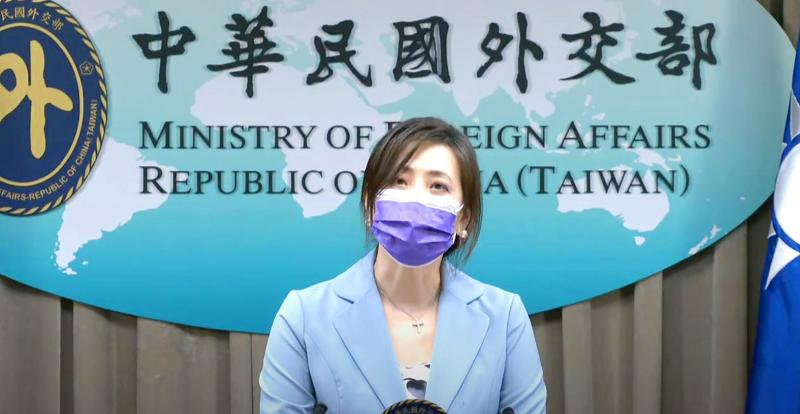The Ministry of Foreign Affairs yesterday denounced Russian President Vladimir Putin for disparaging Taiwan’s sovereignty by saying that Taiwan issues are “China’s internal affairs.”
The ministry strongly condemned Putin’s “false” remarks that “undermined the sovereignty of the Republic of China,” ministry spokeswoman Joanne Ou (歐江安) told a news briefing.
Xinhua news agency cited Putin as telling Chinese President Xi Jinping (習近平) during a telephone call on Wednesday that Russia opposed any interference from external forces in China’s internal affairs, such as in Xinjiang, Hong Kong and Taiwan.

Screengrab from the Ministry of Foreign Affair’s virtual news conference
Ou said that Taiwanese elect their government in free and fair elections, adding that only the government in Taipei can represent Taiwan.
Beijing’s irredentist claims only cause resentment among Taiwanese, she said.
In the face of Beijing’s long-term threats to Taiwan, the government and the public are determined to fight Chinese intimidation, Ou said, adding that their determination is based on the belief that “God helps those who help themselves.”
The government will continue to strengthen Taiwan’s ties with like-minded democratic nations to solicit their support, she added.
By safeguarding freedom, democracy, human rights and the rule of law, Taiwan makes significant contributions to the development and stability of the global economy, she said, calling it a powerful tool to counter China’s authoritarian expansion.
The government will keep boosting Taiwan’s self-defense and asymmetric warfare capabilities, deepening its ties with the US to safeguard a rules-based international order, and promoting peace, stability and prosperity across the Taiwan Strait and in the Indo-Pacific region, she said.
The ministry also thanked the US for reiterating that it would ensure that Taiwan has the ability to defend itself and deter aggression.
US Secretary of State Antony Blinken made the remarks in an interview with the US’ Public Broadcasting Service on Tuesday.
He said that China has over the past decade been “acting more repressively at home and more aggressively abroad,” including through actions against Taiwan, which are “potentially dangerous and destabilizing.”
He urged China to take into consideration the response that Russia’s invasion of Ukraine provoked from countries around the world.
Moreover, the US has promised Taiwan’s safety under its Taiwan Relations Act, Blinken said.
Additional reporting by CNA

NATIONAL SECURITY THREAT: An official said that Guan Guan’s comments had gone beyond the threshold of free speech, as she advocated for the destruction of the ROC China-born media influencer Guan Guan’s (關關) residency permit has been revoked for repeatedly posting pro-China content that threatens national security, the National Immigration Agency said yesterday. Guan Guan has said many controversial things in her videos posted to Douyin (抖音), including “the red flag will soon be painted all over Taiwan” and “Taiwan is an inseparable part of China,” while expressing hope for expedited “reunification.” The agency received multiple reports alleging that Guan Guan had advocated for armed reunification last year. After investigating, the agency last month issued a notice requiring her to appear and account for her actions. Guan Guan appeared as required,

Japan and the Philippines yesterday signed a defense pact that would allow the tax-free provision of ammunition, fuel, food and other necessities when their forces stage joint training to boost deterrence against China’s growing aggression in the region and to bolster their preparation for natural disasters. Japan has faced increasing political, trade and security tensions with China, which was angered by Japanese Prime Minister Sanae Takaichi’s remark that a Chinese attack on Taiwan would be a survival-threatening situation for Japan, triggering a military response. Japan and the Philippines have also had separate territorial conflicts with Beijing in the East and South China

A strong cold air mass is expected to arrive tonight, bringing a change in weather and a drop in temperature, the Central Weather Administration (CWA) said. The coldest time would be early on Thursday morning, with temperatures in some areas dipping as low as 8°C, it said. Daytime highs yesterday were 22°C to 24°C in northern and eastern Taiwan, and about 25°C to 28°C in the central and southern regions, it said. However, nighttime lows would dip to about 15°C to 16°C in central and northern Taiwan as well as the northeast, and 17°C to 19°C elsewhere, it said. Tropical Storm Nokaen, currently

PAPERS, PLEASE: The gang exploited the high value of the passports, selling them at inflated prices to Chinese buyers, who would treat them as ‘invisibility cloaks’ The Yilan District Court has handed four members of a syndicate prison terms ranging from one year and two months to two years and two months for their involvement in a scheme to purchase Taiwanese passports and resell them abroad at a massive markup. A Chinese human smuggling syndicate purchased Taiwanese passports through local criminal networks, exploiting the passports’ visa-free travel privileges to turn a profit of more than 20 times the original price, the court said. Such criminal organizations enable people to impersonate Taiwanese when entering and exiting Taiwan and other countries, undermining social order and the credibility of the nation’s